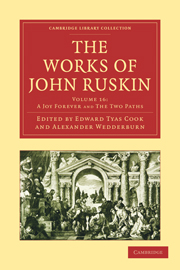Book contents
- Frontmatter
- Contents
- LIST OF ILLUSTRATIONS
- INTRODUCTION TO THIS VOLUME
- PART I “A JOY FOR EVER” BEING THE SUBSTANCE (WITH ADDITIONS) OF TWO LECTURES ON THE POLITICAL ECONOMY OF ART (1857, 1880)
- PART II INAUGURAL ADDRESS AT THE CAMBRIDGE SCHOOL OF ART (1858)
- PART III THE OXFORD MUSEUM (1858, 1859)
- PART IV “THE TWO PATHS” (1859)
- APPENDIX: ADDRESSES AND LETTERS 1856–1860
- I REMARKS ON THE RECENT PROGRESS OF DESIGN AS APPLIED TO MANUFACTURE (MARCH 12, 1856)
- II AN ADDRESS TO THE WORKMEN EMPLOYED ON THE OXFORD MUSEUM (APRIL 18, 1856)
- III THE VALUE OF DRAWING: ADDRESS TO THE ST. MARTIN'S SCHOOL OF ART (APRIL 3, 1857)
- IV THE PRESERVATION OF ITALIAN PICTURES: REMARKS AT A MEETING OF THE ARUNDEL SOCIETY (JUNE 25, 1857)
- V THE ARTS AS A BRANCH OF EDUCATION: A LETTER TO THE REV. F. TEMPLE (SEPTEMBER 27, 1857)
- VI THE STUDY OF ART: ADDRESS TO THE ST. MARTIN'S SCHOOL OF ART (APRIL 16, 1858)
- VII VENETIAN ARCHITECTURE: REMARKS MADE AT A MEETING OF THE ARCHITECTURAL PHOTOGRAPHIC SOCIETY (FEBRUARY 15, 1859)
- VIII RELIGIOUS ART: REMARKS MADE AT A MEETING OF THE WORKING MEN'S COLLEGE (MARCH 8, 1860)
- IX EVIDENCE GIVEN BEFORE THE SELECT COMMITTEE ON PUBLIC INSTITUTIONS (MARCH 20, 1860)
- Plate section
VIII - RELIGIOUS ART: REMARKS MADE AT A MEETING OF THE WORKING MEN'S COLLEGE (MARCH 8, 1860)
Published online by Cambridge University Press: 07 September 2011
- Frontmatter
- Contents
- LIST OF ILLUSTRATIONS
- INTRODUCTION TO THIS VOLUME
- PART I “A JOY FOR EVER” BEING THE SUBSTANCE (WITH ADDITIONS) OF TWO LECTURES ON THE POLITICAL ECONOMY OF ART (1857, 1880)
- PART II INAUGURAL ADDRESS AT THE CAMBRIDGE SCHOOL OF ART (1858)
- PART III THE OXFORD MUSEUM (1858, 1859)
- PART IV “THE TWO PATHS” (1859)
- APPENDIX: ADDRESSES AND LETTERS 1856–1860
- I REMARKS ON THE RECENT PROGRESS OF DESIGN AS APPLIED TO MANUFACTURE (MARCH 12, 1856)
- II AN ADDRESS TO THE WORKMEN EMPLOYED ON THE OXFORD MUSEUM (APRIL 18, 1856)
- III THE VALUE OF DRAWING: ADDRESS TO THE ST. MARTIN'S SCHOOL OF ART (APRIL 3, 1857)
- IV THE PRESERVATION OF ITALIAN PICTURES: REMARKS AT A MEETING OF THE ARUNDEL SOCIETY (JUNE 25, 1857)
- V THE ARTS AS A BRANCH OF EDUCATION: A LETTER TO THE REV. F. TEMPLE (SEPTEMBER 27, 1857)
- VI THE STUDY OF ART: ADDRESS TO THE ST. MARTIN'S SCHOOL OF ART (APRIL 16, 1858)
- VII VENETIAN ARCHITECTURE: REMARKS MADE AT A MEETING OF THE ARCHITECTURAL PHOTOGRAPHIC SOCIETY (FEBRUARY 15, 1859)
- VIII RELIGIOUS ART: REMARKS MADE AT A MEETING OF THE WORKING MEN'S COLLEGE (MARCH 8, 1860)
- IX EVIDENCE GIVEN BEFORE THE SELECT COMMITTEE ON PUBLIC INSTITUTIONS (MARCH 20, 1860)
- Plate section
Summary
1. Mr. Ruskin gave an account of the condition of the Drawing Class, touching on some of the points connected with its management which distinguished it from the rest of the College classes. Referring to the examinations which are to be held on other subjects, he said that nothing of the kind could be attempted in his class; that any sort of competition in art work was invariably pernicious, leading men to strive for effect instead of truth. It was impossible, moreover, for a teacher to be sure that in his own instructions he did not give an advantage to one student over another; he found it, he said, impossible to conquer the temptation to bestow most help on those whom he saw making the most use of what he taught them. This kind of premium was the only thing in the shape of a prize which could find its way into the Drawing Class.
2. Mr. Ruskin then said that as he could only come seldom to the College meetings, he should take the opportunity of telling the students a few of the things which had struck him most during his summer tour on the Continent. He then gave a very lively account of some of the places in which he had been looking at the great masterpieces of German art. “The pictures which I saw in Belgium,” he said, “made me feel the immense difference that exists between the Venetian art and that of the so-called Religious schools. Once I thought, as most of the world does, that the greatest religious art is that which presents the religious element free from all connection with earthly things.
- Type
- Chapter
- Information
- The Works of John Ruskin , pp. 469 - 471Publisher: Cambridge University PressPrint publication year: 2010First published in: 1905

